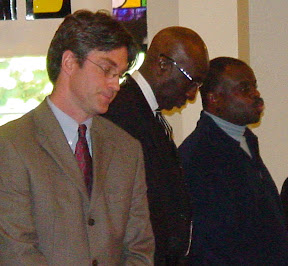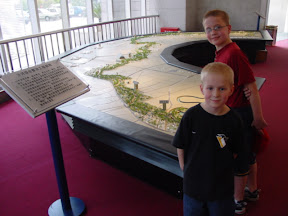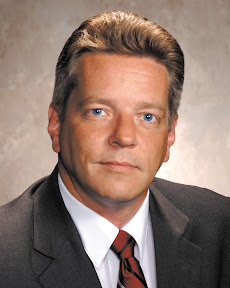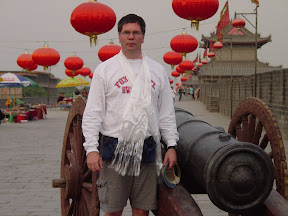Not a good way to break into the realm of city council politics, if you ask me. He talks of TIFs. That is madness, D-party madness. The vision is missing on council as it has been a rubber stamp for all the TIFs that have come down the pike. Few if any have worked. I'm not in favor of any TIFs given the unaccountability of the process and the hurt it causes for the marketplace.
TIFs do NOT encourage people to live in the city. TIFs are a good reason why people move out of the city and vote with their feet. Tax breaks for some, and not others, is a great way to was away the concern for justice.
Quotes from Mr. Dowd's campaign manager re not welcomed either. Let the candidate talk for himself.
Likewise, I feel that city council needs to do more about transportation and advocate for the benefits of the city. But, we need smart actions, not just hyper activity without purpose. What smart solutions does Patrick have about transportation? Complain louder doesn't cut it with me.
Then Patrick talks in glowing terms about the Pittsburgh Promise. It is sure to be a broken promise. The lie of that program is not something that I'm going to rest on the backs of our kids.
Patrick is leaving the school board at a bad time. The schools are NOT in a good position. The gifted education program, magnet schools, and high school situations are all on the rocks.
Mr. Roosevelt is a darling of the foundations and a foe of parental involvement. He wants to make discipline a priority for next year. Why wait? Discipline needs to take root now. I don't want to have the work of the board and administration hide behind a task force. I want that to come to the surface in real time, with real discussion, with real input from all.
The plan to rightsize called for the closing of small schools. The plan for the high schools calls for opening of small schools. What is it?
I want our educaitonal system to fit the city and the buildings that are part of the landscape. Not do more with less. Rather, start with what you got and do a splendid job with what is presented. Then evolve as necessary. Don't close 22 schools in one cut of the ax and wonder, where did all the people go?
I'd like someone to be on council that can stand up to the URA. The South Hills High School should be owned by the URA, not Pgh Public Schools. The transfer of that building is lagging. That needed to be done. We need to work between the city and schools -- and the schools are getting the short end of the stick at every turn -- and Dowd has helped that along.
Then the alternative in the D primary is Len B. He gotta go. I'd take Dowd over Len -- I think. But, neither do anything for me as a concerned citizen of Pittsburgh.
Patrick's got another opportunity to sway my opinions when he begins to speak for himself and when he publishes a web site. But thet talk so far gets him a F-minus!!!! And, he is 'experienced.'
Patrick, why are the city school sports teams not in the WPIAL yet? You could have fixed that, and didn't. Why are the city sports coaches still tied with those ugly union contracts -- forcing good coaches to retire from the sidelines just because they retire from the classroom? You could have fixed that too.
Dowd enters council race The council, he said, currently lacks the vision necessary to deal with the 'bigger issues facing the larger framework of Pittsburgh as a whole,' such as housing reform and public transportation. Dealing with these two issues, he said, will make Pittsburgh more competitive in the future by encouraging people to live in the city.
One of Mr. Dowd's initiatives for housing involves creating residential 'zones,' areas for the council to establish tax increment financing for home buyers. Such tax incentives would offset property tax payments and encourage more people to move into the city, said Abby Wilson, Mr. Dowd's campaign manager.
Mr. Dowd also sees public transportation as a crucial issue for city residents, who make up the majority of Port Authority riders.
'I definitely think City Council needs to be advocating more on this subject,' he said. 'This is a question of equality and public development.'
Mr. Dowd said he would also focus on public safety, government reform, arts and recreation, the environment and energy, and economic development.
Drawing on his experience as a school board member, Mr. Dowd said he would bridge the relationship between the board and City Council, noting that the proposed Pittsburgh Promise scholarship program was a starting point.
'City Council needs people who believe that education is a priority,' he said.
Mr. Dowd, the father of six and a history teacher at The Ellis School in Shadyside, has served on the school board since 2003.
During his term, Mr. Dowd has been a supporter of school Superintendent Mark Roosevelt and has been leading the effort to extend the superintendent's three-year contract beyond August 2008.
In searching for Mr. Dowd's District 2 successor, the same grass-roots coalition that helped him win in 2003 has backed candidate Heather Arnet, 32, also of Highland Park. The District 2 School Board Coalition voted Jan. 6 to endorse Ms. Arnet, executive director of the Women and Girls Foundation of Southwest Pennsylvania. She also supports Mr. Roosevelt.
Furthermore, I'm not happy to have a sub-group hold an election and take away democratic powers of the citizens, before the real election occurs. Perhaps there is a need for more coordination to rid ourselves of a sitting politicians who is clueless -- like Patrick did with D. Harris years ago. But the need for that type of authority and call for lock-step boosterism for an open seat is a poor way to govern.
I'm in favor of an open election. Hold forums. Hold debates. Organize point-by-point match-ups and sustain the conversation for fixing our city. Don't annoint a person as a favorite son or daughter.
Finally, what about the pledge from Patrick to NOT use the office of school board member as a rung in the ladder of political ambition? He wasn't going to be a candidate for other office. He was going to be a school board member -- and not do just what he was doing. That was a pledge that is valid. Now it seems to be ignored.
I want all Pgh Public School Board Members to NOT run for other offices -- as a part of our city's charter, if need be. They use the position for power grabbing, not for serving the needs of the kids and education. I'd rather require that the school board offices be terminal roles then we'd have a different quality of discussions and self-interest of the people on the board.
Give something better than not Len, please.
 |
| Patrick Dowd, Dr. John Thompson, then Superintendent of PPS; Mark Brently (far right). My photo from Pgh Interfaith Impact Network public event in October 2004. people & vips |
UPDATE: Don't pass over these comments. One is from the Dowd campaign manager.







